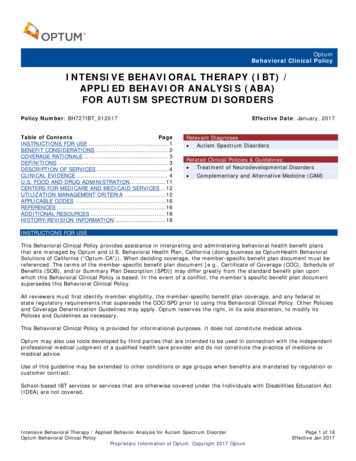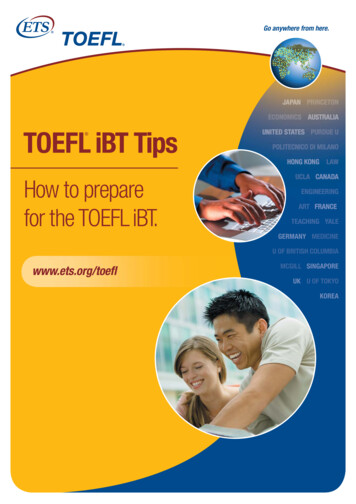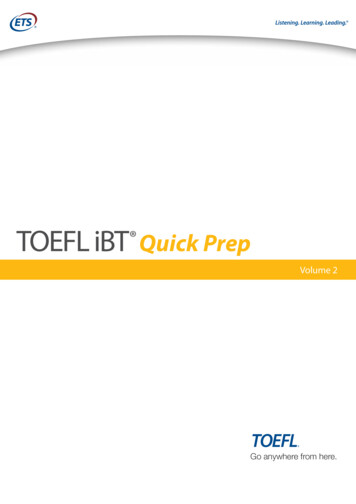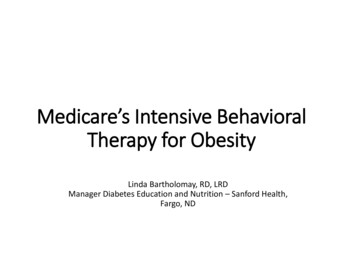
Transcription
DEPARTMENT OF HEALTH AND HUMAN SERVICESCenters for Medicare & Medicaid ServicesROfficial CMS Information forMedicare Fee-For-Service ProvidersIntensive Behavioral Therapy (IBT)for ObesityICN 907800 August 2012
Intensive Behavioral Therapy for ObesityDISCLAIMERThis booklet was current at the time it was published or uploaded onto the web. Medicare policy changes frequentlyso links to the source documents have been provided within the document for your reference.This booklet was prepared as a service to the public and is not intended to grant rights or impose obligations. Thisbooklet may contain references or links to statutes, regulations, or other policy materials. The information providedis only intended to be a general summary. It is not intended to take the place of either the written law or regulations.We encourage readers to review the specific statutes, regulations, and other interpretive materials for a full andaccurate statement of their contents.ICD-9-CM NoticeThe International Classification of Diseases, 9th Revision, Clinical Modification (ICD-9-CM) is published by theUnited States Government. A CD-ROM, which may be purchased through the Government Printing Office, is theonly official Federal government version of the ICD-9-CM. ICD-9-CM is an official Health Insurance Portabilityand Accountability Act standard.NUBC DisclaimerThe American Hospital Association (the “AHA”) has not reviewed, and is not responsible for, the completenessor accuracy of any information contained in this material, nor was the AHA or any of its affiliates, involved in thepreparation of this material, or the analysis of information provided in the material. The views and/or positionspresented in the material do not necessarily represent the views of the AHA. CMS and its products and services arenot endorsed by the AHA or any of its affiliates.Medicare Learning Network (MLN)The Medicare Learning Network (MLN), a registered trademark of CMS, is the brand name for official CMSeducational products and information for Medicare Fee-For-Service Providers. For additional information, visitthe MLN’s web page at -Learning-Network-MLN/MLNGenInfo on the CMS website.Your feedback is important to us and we use your suggestions to help us improve our educational products,services and activities and to develop products, services and activities that better meet your educational needs. Toevaluate Medicare Learning Network (MLN) products, services and activities you have participated in, received,or downloaded, please go to -Learning-Network-MLN/MLNProducts and click on the link called ‘MLN Opinion Page’ in the left-hand menu and follow the instructions.Please send your suggestions related to MLN product topics or formats to MLN@cms.hhs.gov.
Intensive Behavioral Therapy for ObesityTable of ContentsOverview .2Coverage Information .2Documentation .5Coding and Diagnosis Information .5Billing Requirements .7Payment Information .9Reasons for Claim Denial.9Resources .101
Intensive Behavioral Therapy for ObesityThe Centers for Medicare & Medicaid Services (CMS) recognizesthe crucial role that health care providers play in educating Medicarebeneficiaries about potentially life-saving preventive services andscreenings, and in providing these services. While Medicare pays fora variety of preventive benefits, many Medicare beneficiaries do notfully realize that using preventive services and screenings can helpthem live longer, healthier lives. As a health care professional, youcan help your Medicare patients understand the importance of diseaseprevention, early detection, and lifestyle modifications that supporta healthier life. This booklet can help you communicate with yourpatients about Medicare-covered Intensive Behavioral Therapy (IBT)for obesity, as well as assist you in correctly billing for these services.OverviewThe Centers for Disease Control andPrevention (CDC) reported that obesityrates in the U.S. increased dramaticallyover the last 30 years, and obesity is nowan epidemic in the U.S. In the Medicarepopulation, over 30 percent of men andwomen are obese. Obesity is directly orindirectly associated with many chronicdiseases, including: Cardiovascular disease, Musculoskeletal conditions, andRemoval of Barriers to Preventive ServicesUnder the Affordable Care ActMedicare waives the coinsurance or copayment and deductiblefor those Medicare-covered preventive services recommendedby the United States Preventive Services Task Force (USPSTF)with a grade of A or B for any indication or population, and thatare appropriate for the individual.The Affordable Care Act authorizes CMS to add coverage of“additional preventive services” through the National CoverageDetermination (NCD) process. For CMS to add a preventiveservice, it must be: Diabetes.Reasonable and necessary for the prevention or earlydetection of an illness or disability;Recommended with a grade of A or B by the USPSTF; andAppropriate for individuals entitled to benefits underPart A or enrolled under Part B of the Medicare Program.Coverage InformationEffective with dates of service on or after November 29, 2011, Medicare covers IBT for obesity,defined as a body mass index (BMI) of 30 kilograms per meter squared, for the prevention or earlydetection of illness or disability. IBT for obesity consists of the following: Screening for obesity in adults using measurement of BMI, which is calculated by dividingweight in kilograms by the square height in meters; Dietary (nutritional) assessment; and Intensive behavioral counseling and behavioral therapy to promote sustained weight lossthrough high intensity interventions on diet and exercise.2
Intensive Behavioral Therapy for ObesityMedicare provides coverage of IBT for obesity(BMI 30 kilograms per meter squared) forMedicare beneficiaries: Who are competent and alert at the time thatcounseling is provided; and Whose counseling is furnished by aqualified primary care physician or otherprimary care practitioner and in a primarycare setting.Stand Alone BenefitThe IBT for obesity benefit covered by Medicareis a stand alone billable service. It is separate fromthe Initial Preventive Physical Examination (IPPE)or the Annual Wellness Visit (AWV). Medicarebeneficiaries may obtain IBT for obesity servicesat any time following Medicare Part B enrollment,including during their IPPE or AWV encounter.Each IBT for obesity must be consistent with the 5A’s approach adopted by the USPSTF. Thisapproach includes:1. Assess: Ask about or assess behavioral health risk(s) and factors affecting choice ofbehavior change goals or methods;2. Advise: Give clear, specific, and personalized behavior change advice, includinginformation about personal health harms and benefits;3. Agree: Collaboratively select appropriate treatment goals and methods based on thebeneficiary’s interest in and willingness to change the behavior;4. Assist: Using behavior change techniques (self-help and/or counseling), aid thebeneficiary in achieving agreed-upon goals by acquiring the skills, confidence, and socialor environmental supports for behavior change, supplemented with adjunctive medicaltreatments when appropriate; and5. Arrange: Schedule follow-up contacts (in person or by telephone) to provide ongoingassistance or support and to adjust the treatment plan as needed, including referral tomore intensive or specialized treatment.3
Intensive Behavioral Therapy for ObesityPrimary Care Setting DefinedFor the purpose of this benefit, a primary caresetting is defined as one in which there is aprovision of integrated, accessible health careservices by clinicians who are accountable foraddressing a large majority of personal healthcare needs, developing a sustained partnershipwith patients, and practicing in the contextof family and community. The following arenot considered primary care settings underthis definition:Who Are Primary Care Physiciansand Practitioners?For the purpose of the IBT for obesity benefit:Primary Care PhysicianA physician who has a primary specialty designation of:Family practice,General practice,Geriatric medicine, Ambulatory surgical centers,Internal medicine, Emergency departments,Obstetrics/gynecology, or Hospices,Pediatric medicine.Primary Care PractitionerA qualified non-physician practitioner is a: Independent diagnostic testing facilities, Inpatient hospital settings,Certified clinical nurse specialist, Inpatient rehabilitation facilities, andNurse practitioner, or Skilled nursing facilities.Physician assistant.Medicare covers IBT for obesity provided in:Primary care physicians’ and practitioners’corresponding specialty codes apply when billingprofessional claims. When billing institutional claims,follow billing instructions based on your facility type. An independent clinic, An outpatient hospital,NOTE: In addition, Medicare may coverbehavioral counseling for obesity serviceswhen billed by one of the providerspecialty types listed above and furnishedby auxiliary personnel under the conditionsspecified under our regulation at 42 Codeof Federal Regulations (CFR) Section410.26(b) (conditions for services andsupplies incident to a physician’s professionalservice) or 42 CFR Section 410.27 (conditionsfor outpatient hospital services and suppliesincident to a physician service). A physician’s office, or A state or local public health clinic.FrequencyMedicare covers a maximum of 22 IBT forobesity sessions in a 12-month period.Medicare beneficiaries who meet the previouslymentioned criteria are eligible for: One face-to-face visit every week for thefirst month; One face-to-face visit every other week for months 2 – 6; and One face-to-face visit every month for months 7 – 12, if the beneficiary meetsthe 3 kg (6.6 pounds) weight loss requirement during the first 6 months.4
Intensive Behavioral Therapy for ObesityAt the 6-month visit, a reassessment of obesity and a determination of the amount of weight lossmust be performed. To be eligible for additional face-to-face visits occurring once a month foran additional 6 months, beneficiaries must have achieved a reduction in weight of at least 3 kg(6.6 pounds) over the course of the first 6 months of intensive therapy. This determination mustbe documented in the physician office records for applicable beneficiaries consistent with usualpractice. For beneficiaries who do not achieve a weight loss of at least 3 kg (6.6 pounds) duringthe first 6 months of intensive therapy, a reassessment of their readiness to change and BMI isappropriate after an additional 6-month period.EXAMPLE: A beneficiary gets the first IBT for obesity session in January 2012 and gets all22 sessions. The count starts February 2012. The beneficiary may get another first IBT for obesitysession in January 2013.Coinsurance or Copayment and DeductibleThe beneficiary pays nothing (no coinsurance or copayment and no Medicare Part B deductible)for IBT for obesity. Financial responsibilities may apply for the beneficiary if the provider does notaccept assignment.DocumentationMedical records must document all coverage requirements, including the determination of weightloss at the 6-month visit.Coding and Diagnosis InformationProcedure Codes and DescriptorsUse the following Healthcare Common Procedure Coding System (HCPCS) code, listed in Table 1,to report IBT for obesity.Table 1. HCPCS Code for IBT for ObesityHCPCS CodeCode DescriptorG0447Face-to-face behavioral counseling for obesity, 15 minutesDiagnosis RequirementsYou must report one of the followingInternational Classification of Diseases, 9thRevision, Clinical Modification (ICD-9-CM)screening (“V”) diagnosis code(s), listed inTable 2, for IBT for obesity.5Coming Soon!International Classification of Diseases, 10thRevision, Clinical Modification/ProcedureCoding System (ICD-10-CM/PCS)For more information, visit http://www.cms.gov/Medicare/Coding/ICD10 on the CMS website.
Intensive Behavioral Therapy for ObesityTable 2. Diagnosis Codes for IBT for ObesityICD-9-CM Diagnosis CodeCode DescriptorV85.30Body Mass Index 30.0 – 30.9, adultV85.31Body Mass Index 31.0 – 31.9, adultV85.32Body Mass Index 32.0 – 32.9, adultV85.33Body Mass Index 33.0 – 33.9, adultV85.34Body Mass Index 34.0 – 34.9, adultV85.35Body Mass Index 35.0 – 35.9, adultV85.36Body Mass Index 36.0 – 36.9, adultV85.37Body Mass Index 37.0 – 37.9, adultV85.38Body Mass Index 38.0 – 38.9, adultV85.39Body Mass Index 39.0 – 39.9, adultV85.41Body Mass Index 40.0 – 44.9, adultV85.42Body Mass Index 45.0 – 49.9, adultV85.43Body Mass Index 50.0 – 59.9, adultV85.44Body Mass Index 60.0 – 69.9, adultV85.45Body Mass Index 70 and over, adult6
Intensive Behavioral Therapy for ObesityBilling RequirementsBilling and Coding Requirements When Submitting Professional ClaimsWhen you submit professional claims to carriers or A/B Medicare Administrative Contractors(MACs), report the appropriate HCPCS code and the corresponding ICD-9-CM diagnosis codein the X12 837-P (Professional) electronic claim format. You must also include Place of Service(POS) codes on all professional claims, to indicate where you provided the service. For moreinformation on POS codes, visit e-codes onthe CMS website.NOTE: If you qualify for an exception to theAdministrative Simplification ComplianceAct (ASCA) requirement, you may useForm CMS-1500 to submit these claimson paper. All providers must use FormCMS-1500, version 08-05, when submittingpaper claims. For more information on FormCMS-1500, visit ingEDITrans/16 1500.html on the CMS website.Electronic Claims RequirementsASCA requires providers to submit claims toMedicare electronically, with limited exceptions.For more information about the electronicformats, visit http://www.cms.gov/Medicare/B i l l i n g / E l e c t r o n i c B i l l i n g E D I Tr a n s /HealthCareClaims.html on the CMS website.Billing and Coding Requirements When Submitting Institutional ClaimsWhen you submit institutional claims to Fiscal Intermediaries (FIs) or A/B MACs, report theappropriate HCPCS code, revenue code, and the corresponding ICD-9-CM diagnosis code inthe X12 837-I (Institutional) electronic claim format.NOTE: If an institution qualifies for an exception to the ASCA requirement, it may use FormCMS-1450 to submit these claims on paper. All providers must use Form CMS-1450(UB-04) when submitting paper claims. For more information on Form CMS-1450,visit ingEDITrans/15 1450.html onthe CMS website.7
Intensive Behavioral Therapy for ObesityTypes of Bill (TOBs) for Institutional ClaimsThe FI or A/B MAC pays for IBT for obesity when submitted on the following TOBs, listed in Table 3.For further guidance on the appropriate revenue code, contact your local Medicare Contractor.Table 3. Facility Types and TOBs for IBT for ObesityFacility TypeTOBHospital Outpatient13XRural Health Clinic (RHC)71XFederally Qualified Health Center (FQHC)77XCritical Access Hospital (CAH)85XAdditional Billing Instructions for FQHCs and RHCsThe professional component of preventive services is within the scope of covered FQHC or RHCservices. The professional component is a physician’s interpretation of the results of an examination.For instructions on billing the professional component, visit SE1039.pdfon the CMS website.The technical component is services rendered outside the scope of the physician’s interpretationof the results of an examination. If you perform technical components or services, not within thescope of covered FQHC or RHC services, in association with professional components, how youbill depends on whether the FQHC or RHC is independent or provider-based: For Provider-Based FQHCs or RHCs: Bill the technicalcomponent of the service on the TOB for the base providerand submit to the FI or A/B MAC in the 837-I format.For more information on billing instructions for providerbased FQHCs or RHCs, visit 12.html on the CMSwebsite and choose the appropriate chapter based on yourfacility type. For Independent FQHCs or RHCs: Bill the technicalcomponent of the service to the carrier or A/B MAC in the837-P format. For more information on billing instructionsfor independent FQHCs or RHCs, visit ce/Manuals/Downloads/clm104c12.pdf and e/Manuals/Downloads/clm104c26.pdf on the CMS website.Copyright 2011, the American Hospital Association, Chicago, Illinois. Reproduced with permission.No portion of this publication may be copied without the express written consent of the AHA.8
Intensive Behavioral Therapy for ObesityPayment InformationProfessional ClaimsWhen you bill your carrier or A/B MAC,Medicare pays for IBT for obesity under theMedicare Physician Fee Schedule (MPFS).As with other MPFS services, thenon-participating provider reduction andlimiting charge provisions apply to all IBTfor obesity services.Institutional ClaimsProviders Must Use EFTAll providers enrolling in the Medicare Programfor the first time, changing existing enrollmentdata, or revalidating enrollment must use ElectronicFunds Transfer (EFT) to get payments. For moreinformation about EFT, visit ingEDITrans/EFT.html on the CMS website.When you bill your FI or A/B MAC, Medicare payment for IBT for obesity depends on the type offacility providing the service. Table 4 lists the type of payment that facilities get.Table 4. Facility Payment Methods for IBT for ObesityFacility TypeBasis of PaymentHospital Outpatient*Outpatient Prospective Payment System (OPPS)RHCAll-Inclusive Payment RateFQHCAll-Inclusive Payment RateMethod I: 101% of reasonable cost for technicalcomponent(s) of servicesCAHMethod II: 101% of reasonable cost for technicalcomponent(s) of services, plus 115% of MPFSnon-facility rate for professional component(s) of services* Medicare pays Maryland hospitals for inpatient or outpatient services according to the MarylandState Cost Containment Plan.Reasons for Claim DenialMedicare may deny coverage of IBT for obesityin several situations, including:Medicare Contractor Contact InformationFor carrier, FI, or A/B MAC contact information,visit ctive-Map on the CMS website. The beneficiary got more than 22 IBT forobesity sessions in the last 12 months. The beneficiary got IBT for obesity outsideof the primary care setting.9
Intensive Behavioral Therapy for ObesityYou may find specific payment decisioninformation on the Remittance Advice (RA).The RA includes Claim Adjustment ReasonCodes (CARCs) and Remittance AdviceRemark Codes (RARCs) that provide additionalinformation on payment adjustments. Forthe most current listing of these codes, visithttp://www.wpc-edi.com/reference on the Internet.You can obtain additional information aboutclaims from your carrier, FI, or A/B MAC.RA InformationFor more information about the RA, visit ingEDITrans/Remittance.html on the CMS website.ResourcesFor more information about IBT for obesity, refer to the resources listed inTables 5 and 6. For educational products for Medicare Fee-For-Service health careprofessionals and their staff, information on coverage, coding, billing, payment,and claim filing procedures, visit es.htmlon the CMS website, or scan the Quick Response (QR) code to the right with yourmobile device.Table 5. Provider ResourcesResourceWebsiteCMS Beneficiary NoticesInitiative nformation/BNI“CMS Electronic Mailing Lists:Keeping Medicare Fee-ForService Providers ads/MailingLists FactSheet.pdf“Medicare Claims ProcessingManual” – Publication 100-04,Chapter 18, Section dance/Manuals/Downloads/clm104c18.pdf10
Intensive Behavioral Therapy for ObesityTable 5. Provider Resources (cont.)ResourceMedicare Learning Network (MLN) Guided Pathways toMedicare ResourcesWebsiteThe MLN Educational Web Guides MLN Guided Pathwaysto Medicare Resources helps providers gain knowledge onresources and products related to Medicare and the CMSwebsite. For more information about preventive services,refer to the “Coverage of Preventive Services” sectionin the “MLN Guided Pathways to Medicare Resources –Basic Curriculum for Health Care Professionals, Suppliers,and Providers” booklet at d Pathways BasicBooklet.pdf on the CMS website.For all other “Guided Pathways” resources, visit -LearningNetwork-MLN/MLNEdWebGuide/Guided Pathways.htmlon the CMS website.“Medicare National CoverageDeterminations Manual” –Publication 100-03, Chapter 1,Part 4, Section Guidance/Manuals/Downloads/ncd103c1 Part4.pdfMedicare Physician FeeSchedule -ServicePayment/PhysicianFeeSchedMedicare Preventive ServicesGeneral PrevntionGenInfoMLN Matters Article MM7641, “Intensive Behavioral nloads/(IBT) for Obesity”MM7641.pdfMLN Matters Articles Relatedto Medicare-coveredPreventive /MLNPrevArticles.pdfOutpatient Prospective PaymentSystem -ServicePayment/HospitalOutpatientPPSUSPSTF Screening for Obesityin AdultsFor a summary of the USPSTF written recommendationson screening for obesity in adults, visit f/uspsobes.htmon the Internet.11
Intensive Behavioral Therapy for ObesityTable 6. Beneficiary ResourcesResourceWebsite/Contact Information“Medicare & You: Stay Healthywith Medicare’s PreventiveBenefits” Videohttp://www.youtube.com/watch?v mBCF0V4R4A0&feature relmfuMedicare Beneficiary Help Lineand WebsiteTelephone:Toll-Free: 1-800-MEDICARE (1-800-633-4227)TTY Toll-Free: 1-877-486-2048Website: http://www.medicare.gov“Publications forMedicare ownloads/BenePubFS-ICN905183.pdfYour Medicare Coverage:Obesity Screening & -screening-andcounseling.htmlYour Medicare Coverage:Preventive & Screening e-andscreening-services.html12
This page intentionally left blank.
ROfficial CMS Information forMedicare Fee-For-Service ProvidersThe Medicare Learning Network (MLN), a registered trademark of CMS, is the brand name for official CMSeducational products and information for Medicare Fee-For-Service Providers. For additional information,visit the MLN’s web page at -Learning-NetworkMLN/MLNGenInfo on the CMS website.
practice. For beneficiaries who do not achieve a weight loss of at least 3 kg (6.6 pounds) during the first 6 months of intensive therapy, a reassessment of their readiness to change and BMI is appropriate after an additional 6-month period. EXAMPLE: A beneficiary gets the first IBT for obesity session in January 2012 and gets all 22 sessions.










